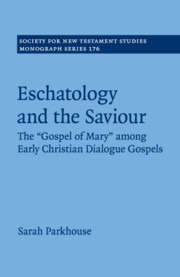Part I
Published online by Cambridge University Press: 16 August 2019
Summary
Chapter 1 looks at previous scholarly work on ‘dialogue gospels’ and offers a new group of 13 early Christian texts in which Jesus engages in dialogue with his disciples, answering their questions on the eve of his departure. Earlier classifications of dialogue gospels have varied widely, resulting in divergence regarding both what to call the genre and which texts are to be included in it. To construct a genre for the purpose of comparison, I argue for an inclusive and open understanding of genre. The 13 chosen texts demonstrate that the dialogue gospel form is not intrinsically linked to ‘gnosticism’ or any specific theology; that the narrative frame of the text and the dialogue are normally not two separate entities later glued together; and that the dialogical form is a fitting vehicle for eschatological revelation. This is followed by a preliminary comparative survey of main themes found within dialogue gospels: the saviour and eschatology. Dialogue gospels are comparable in that each is attentive to eschatological revelation, yet the revelations themselves are divergent. The overlaps and connections within these revelations demonstrate how problematic it is to taxonomize these texts into particular theological groups.
Keywords
- Type
- Chapter
- Information
- Eschatology and the SaviourThe 'Gospel of Mary' among Early Christian Dialogue Gospels, pp. 11 - 126Publisher: Cambridge University PressPrint publication year: 2019



